
By Francesco Bianchini
If I flare the nostrils of memory I can smell – among other aromas – a subtle but persistent odor of cheese emanating from the circumscribed world of my childhood. I had an acute aversion to cheese, so much so I couldn’t even smell it. Not just from the wheels of sheep-milk pecorino cheese, those left to age in the servants’ quarters beyond the kitchen and the pantry, but also the smell of cow-milk caciotta that our farm below the house produced with rather advanced means for those times. I’d go to the kitchen before lunch to make sure that Augusta had remembered to set aside a plate of pasta for me without parmesan.
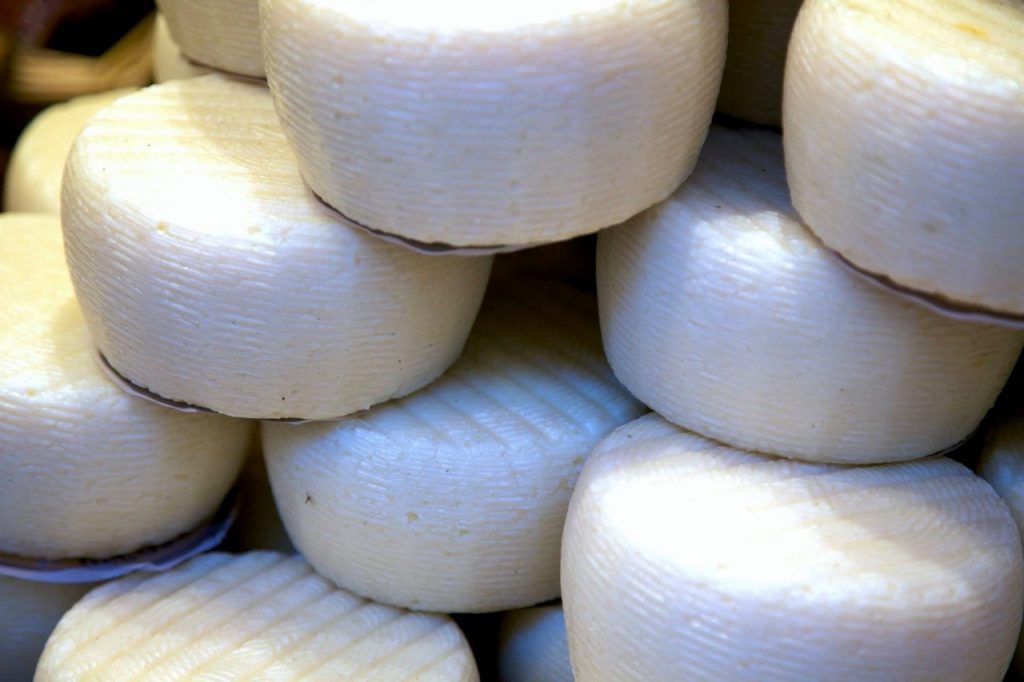
Plump white, round – and smelly!
My father was but twenty-five years old when he married my mother, his cousin, and abandoned his Roman dolce vita to exile himself in Umbria to administer his grandfather’s rather messy estate. There were no other males in our family. Things had not gone right, he was told, now it’s all yours, you’ll figure it out. Thus, fresh from his university degree in agriculture, and to make ends meet, Papa began to deliver our cheese. He had a white Renault L4 from which he had removed the back seat in order to load as many wheels as possible. When he reassembled the back seat to take the family somewhere, I would gag because of the cheesy smell that I hated, and that couldn’t be dispelled. Even the rooms adjoining our entrance hall, where the cheese was stored while waiting to be loaded into the Renault, also smelled of caciotta. In the estate office, the stench mingled with the smell of discarded furniture, old ledgers, antiquated filing cabinets, reams of paper stuck together.
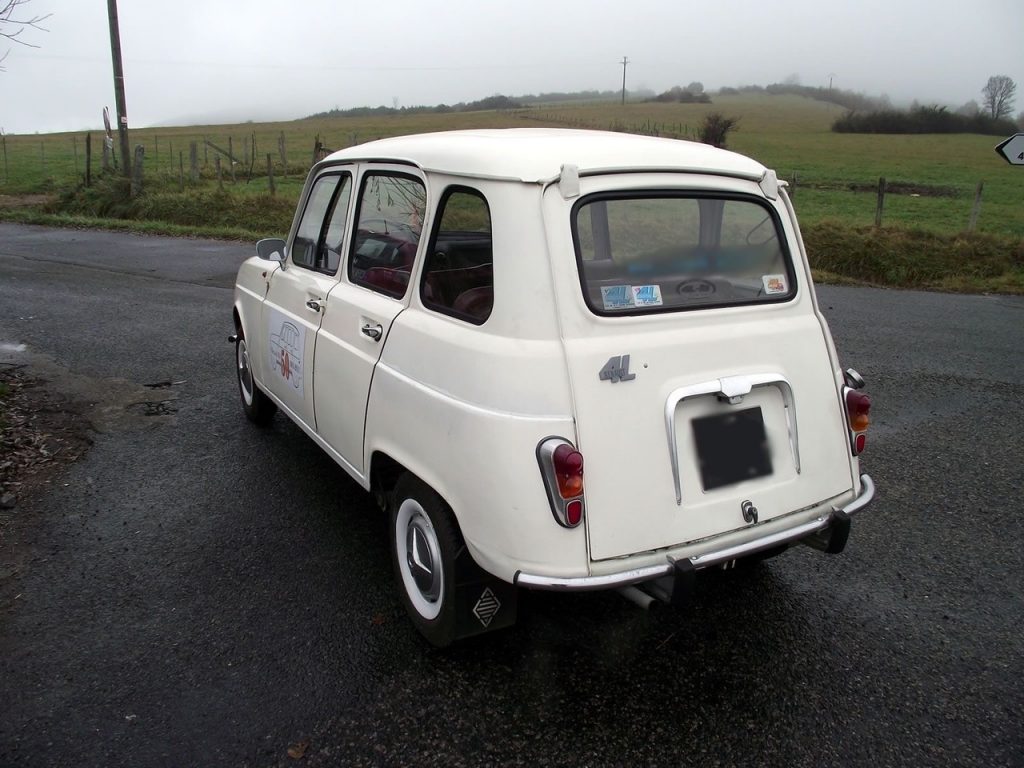
The delivery wagon
I don’t know how many Umbrians remember torchietti: local bakeries produced them on January 17th, and for this reason, they were known as torchietti di Sant’Antonio. Every parish priest blessed them along with farm animals in those long-gone times in which central Italy was essentially a peasant civilization. They reappeared at our tables at Easter when every household was preparing pizza di Pasqua – towering cheese bread – but bakeries produced torchietti in continuous rhythm all year long. Because it is shaped like a doughnut, I remember you could stick your little hand through it. There was nothing cheaper and you could always buy one when you were hungry, sometimes still hot from the oven, slightly flattened, their golden surface dotted with chunks of lightly toasted pecorino cheese.
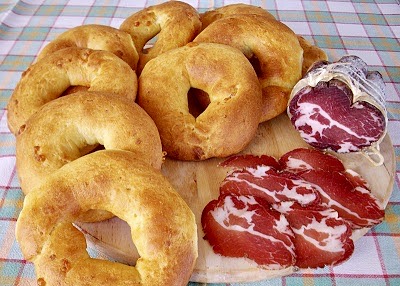
Torchietti di Sant’Antonio
When Rodolfo brought the blessed torchietti home in large brown paper bags he’d slavishly distribute them but was angered when we playfully garlanded our wrists with them, making a lot of fuss before devouring them. He always had ready expressions of affected disapproval for these cases; for him, the sanctity of the church was a social necessity to be safeguarded – especially by the village matriarchy whose force and excesses he secretly mocked. I’d make a point of removing all the little bits of pecorino before eating my torchietto.
My parents tried their best to change my mind about cheese: these were not times when food intolerance was excused. When my mother caught me doing something like picking my nose, she’d force a piece of parmesan into my mouth. My father, on the other hand, promised me a set of the Garzanti Encyclopedia, in two red volumes with green cloth spines, if I ate an entire ball of mozzarella cheese. All things must pass, and so did my antipathy to cheese, which in time has turned into its exact opposite.
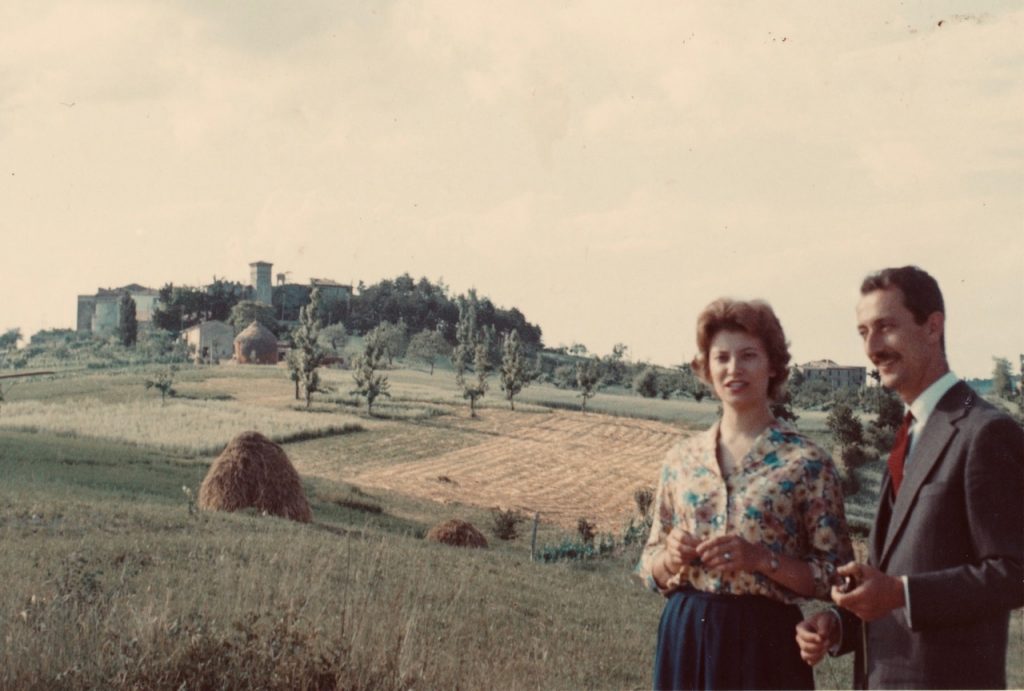
Mum and Dad in one of the first years of their marriage with the village of Collevalenza in the distance
Our house at Collevalenza had a private side – more dignified and coherent – facing the garden, and a public side – all indentations and protrusions – which glared at the village. There were two windows on the second floor overlooking the church square, which was our eyes on the outside world, but that also functioned as the openings through which we were observed. They could sometimes serve to communicate moods across a frontier that was believed inviolable. In any case, a symbiosis between the two worlds existed, and in many a way, the two worlds interacted. The windows opened inward onto a small passageway with a vaulted ceiling, delicately decorated. It was through one of them that my paternal grandfather introduced to the villagers his bride from the north, my grandmother Margherita. My grandparents would eventually go and live in a Roman apartment overlooking a corner of Villa Torlonia from which they could see Mussolini galloping or Donna Rachele, his wife, tending to her vegetable garden. But a stop in Collevalenza immediately after their wedding was a must. The yellow Rolls Royce, lent for the wedding by my great-grandfather’s business partner, drove up the avenue of what was then nothing more than a beloved holiday home. Meanwhile, the whole village was waiting under the window next to the church to see the new bride. Grandfather and grandmother were holding hands and approached the opening from where everyone could see them. It is likely that Margherita was wearing an afternoon dress well above the calf, of a style never seen in those parts before. My grandfather put a record on the phonograph, maybe a tango. They danced in front of the whole village and that’s when the applause roared. It was 1928. Eight years later the villagers saw Margherita again at the window, this time covered from head to toe in black crepe.
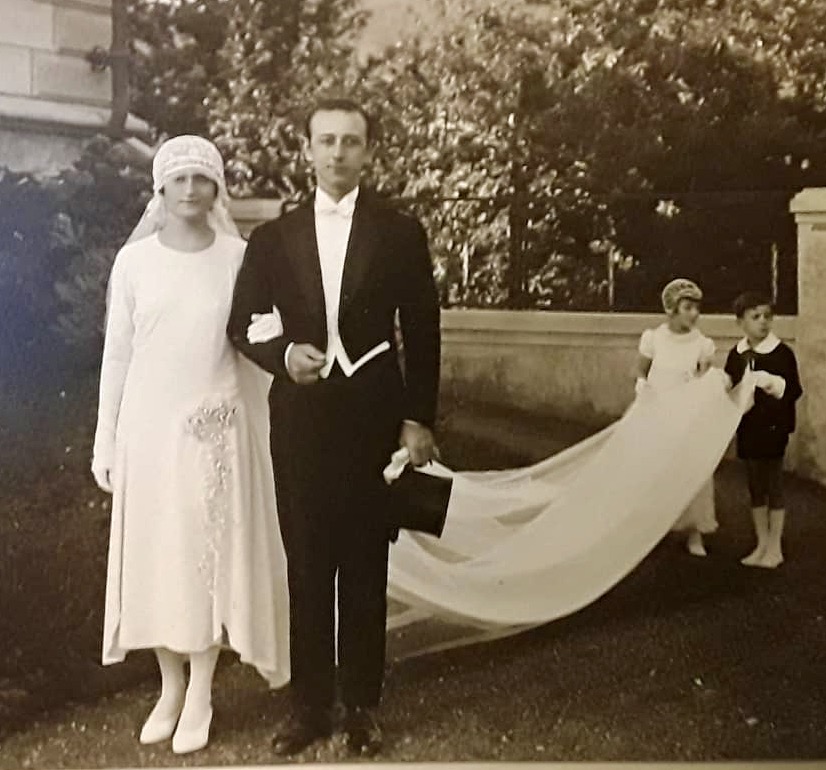
Grandmother Margherita and grandfather Francesco on their wedding day, 1928 |
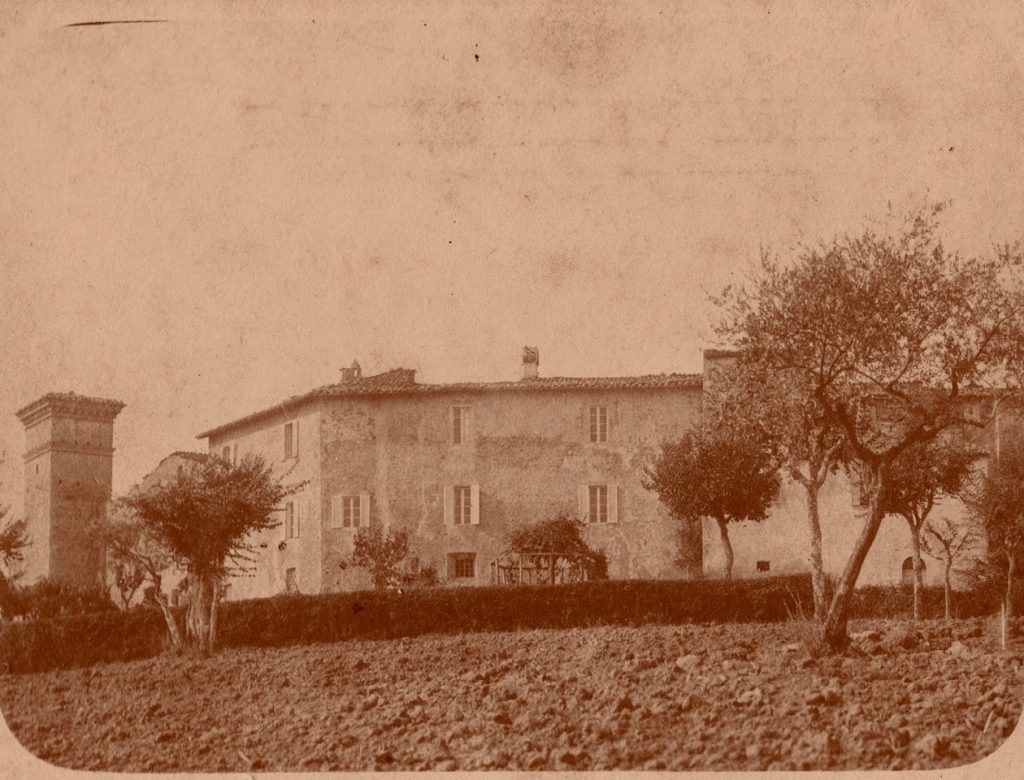
The balanced façade facing its garden, as opposed to the disordered village side |
The same window was used by the Nazi SS officer, who had commandeered our house, to read dry communiqués, and it was still wartime when the first telephone was installed in that room. For as long as the device, working through an operator, remained there, conversations were shouted into the receiver and echoed under the painted vault, thus becoming public domain, especially when the window was open. The only other telephone in town was located in the post office. I remember it, in the 1960s, equipped with a transparent plastic bubble that was supposed to provide some privacy. But to the postwoman, who had ears even in the back of her head – hidden under her teased hair – nothing escaped from those telephone conversations.
In the little frescoed passage, which also served as our music room, stood my aunt Gabriella’s Pleyel piano, which I began to play at the age of eleven. Thenceforward the whole village was forced to follow my progress. When I was able to play something decent, my sister Sofia – whose hair I festooned with ribbons – would announce my pieces from the window. As we were constantly watched by a hundred eyes, the most tantalizing things had to be done in secret: running around in cellars and attics, opening cupboards, climbing on the roof, letting friends in through a hole in the garden fence was the mischief that, if reported, was punishable with a riding crop. The desire for novelty, adventure, and experimentation were too great in that house that offered so many ideas, but in which we had to invent our own games.
The temptation to do something rash would suddenly seize me and cloud the possible consequences. One day I discovered a carton of round cheese labels in the estate office. They had the same musty smell like everything else in that room. My father, who had designed them and had them printed, had reproduced a cute cow with an almost human expression, frolicking in a green meadow against a background of small trees and a blue sky. The name of our farm appeared all around on a scarlet scroll. In short, they were a very lively and festive sight that immediately gave me an idea. It must have been a Saturday because a wedding – accompanied by a lot of car honking – was then taking place in the church. I waited for the bride and groom to emerge onto the front steps and in the midst of the rain of rice that targeted them, I tossed handfuls of those caciotta labels from the famous window, that swirled merrily over the crowd.







